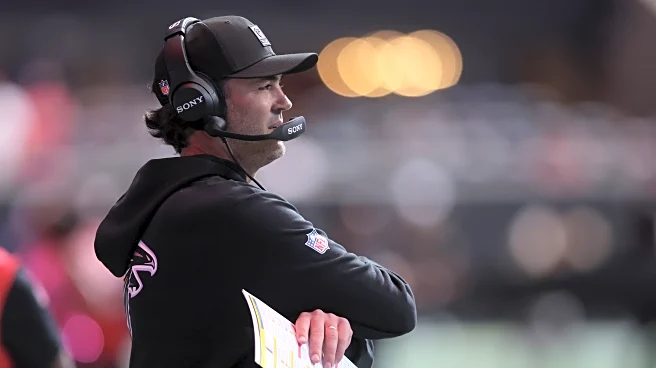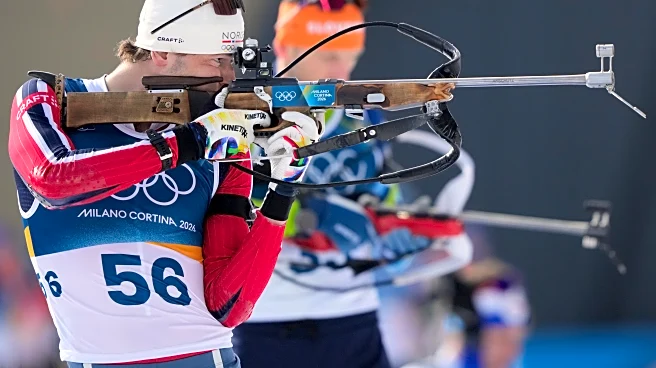Are you bad at something if you never do it, or does never doing it make you bad at it?
The Atlanta Falcons lack of a middle-of-the-field (MOF) passing attack is starting to draw more attention. Michael
Penix Jr.’s passing charts on NextGenStats are raising questions about what’s going on. Is it the coach, quarterback, or something else? Let’s take a closer look at Week 8’s biggest question.
The Scheme
“Because of Zac Robinson, duh!” Yes, most fans will tell you that everything that’s happening is the offensive coordinator’s fault. While this is a hyperbolic take, there is no denying that ZRob plays a significant role. Some have cited Penix’s lack of MOF success dating back to college, and we’ll get to that later, but the Falcons lack of MOF success didn’t start in 2025.
Last year, I talked about the lack of complementary route concepts in this offense and how that especially hurt them against pressure. Since Robinson’s arrival, Atlanta has primarily utilized smash, double corner switches, and stick concepts. Robinson wants to attack from around the numbers to the boundary. Defenses know this and like to sit on the corner routes while taking away options outside the seams. It speaks to the “predictable offense” narrative that hangs over this unit like a dark cloud.
The Falcons need to start running complementary concepts that break tendencies and force the defense to account for every square inch of grass. We’ve seen them flirt with levels, follows, scissors, and other concepts, but they aren’t efficient at running them. They also aren’t run more than a handful of times per game. Lack of efficiency and frequency are how one would also describe this team’s play action offense.
It’s no secret that the Falcons play action offense is abysmal. The offense has the worst EPA/Pass (-0.50) on play action plays, while running the fewest play-action plays (37) in the league. Again, another issue that didn’t start in 2025—Atlanta was dead last in total play action plays in 2024 (85). Kirk Cousins shouldered the blame; it was his Achilles heel that held that part of the Falcons offense back, but Zac Robinson has dispelled those takes by running back the same strategy with Michael Penix.
There is no marriage between the Falcons run game and play action game. Together, they are Frankenstein’s monster, parts haphazardly sewn together from different eras of the McVay offense and called “innovation” while ignoring the fundamental principles of those designs. When a play finally looks like it will work, the group fails to execute. Against Minnesota, Penix threw a dime to Drake London off a play action rollout, but London fumbled the explosive play away. Last week against the 49ers, ZRob called what might be the best play action play we’ve seen in the past two years, but an Elijah Wilkinson hold negated it.
This is a volatile group that has multiple self-inflicted wounds per game, and they seem to occur in the areas where the team struggles the most. Only so many position coaches can go down until the man responsible for the final product has to be held accountable. Robinson can’t force these players to execute, but he can put them in better positions, break tendencies, and up the frequency of complementary route concepts. If he can’t do these things, the offense won’t change.
The Quarterback
As noted earlier, Penix’s MOF struggles are not new. The quarterback wasn’t very efficient there in college, but he wasn’t asked to do it much then, either. This has carried over to the NFL, and it’s caught fans by surprise after Penix showed the ability to attack that area of the field off the bench in 2024. What’s changed the most is that Penix isn’t capitalizing on the minimal opportunities he gets in a game.
Penix looks somewhat gunshy. Post-snap coverage rotations have given the quarterback issues, and perhaps that’s causing some hesitation. There could also be an overemphasis on “not taking chances” or “putting the ball in harm’s way” that leads the quarterback to question himself in these moments—either way, his current approach needs to change.
Young quarterbacks traditionally struggle attacking this area of the field, and when you add in the lack of reps and opportunities, it’s easy to understand why Penix is struggling. If the quarterback isn’t in an offense that attacks the MOF, how is he supposed to improve at attacking the MOF? Giving him a handful of looks per game isn’t going to spur development, and those habits start in practice. The team doesn’t show up on Sunday and decide they won’t attack that area of the field, it’s built into the game plan on Tuesday.
Yes, Penix has to be better at ripping the ball when his receivers are open; that is supposed to be one of his strengths. There have been points left on the field due to mental errors, but beneath the surface, it looks like the coach is scared of upping the opportunities. I want to reiterate that this issue started last year. Kirk Cousins was known for his MOF ability, and we did not see the Falcons maximize that last season. It didn’t become noticeable until Cousins injured his throwing arm.
From that point forward, every out and corner route looked like a struggle, and the lack of short-intermediate opportunities in the MOF became a glaring weakness of the passing scheme. Cousins was able to make do with the limited opportunities he got up until that point, but the idea that we would see a shift in philosophy if he were playing now doesn’t align with what we’ve seen.
What Penix needs are opportunities and a staff that’s comfortable watching him go through the ups and downs that come with development. I understand the Falcons want to limit turnovers and control time of possession, but playing not to lose will have drawbacks, one of them being that your young QB will be unprepared when you eventually have no other option but to lean on them.
Atlanta can’t hide behind its yardage stats as the reason to stay the course with its current scheme. No one’s arguing that what they currently do doesn’t work to a certain extent, but the offense’s limitations show up every other week, and the best schemes in the league aren’t built around attacking only 2/3’s of the field.
Penix and Co. have to do their part. There are only so many plays in a game and only so many chances to make mistakes in this league. Penix can only control what he can; he has to rip those MOF plays without fear, and his teammates need to execute. Zac Robinson has to be willing to lose his job over Penix’s play to the fullest degree. There is no situation where Penix doesn’t work out, and Robinson does, so it’s time to go out swinging and unleash the middle of the field.
If the Falcons can make progress with their MOF passing game, the volatility surrounding their passing attack will lessen, providing the balance that has been missing. If Penix doesn’t become more efficient and/or Robinson doesn’t grow, we’ll be able to make more concrete conclusions about both of them.










